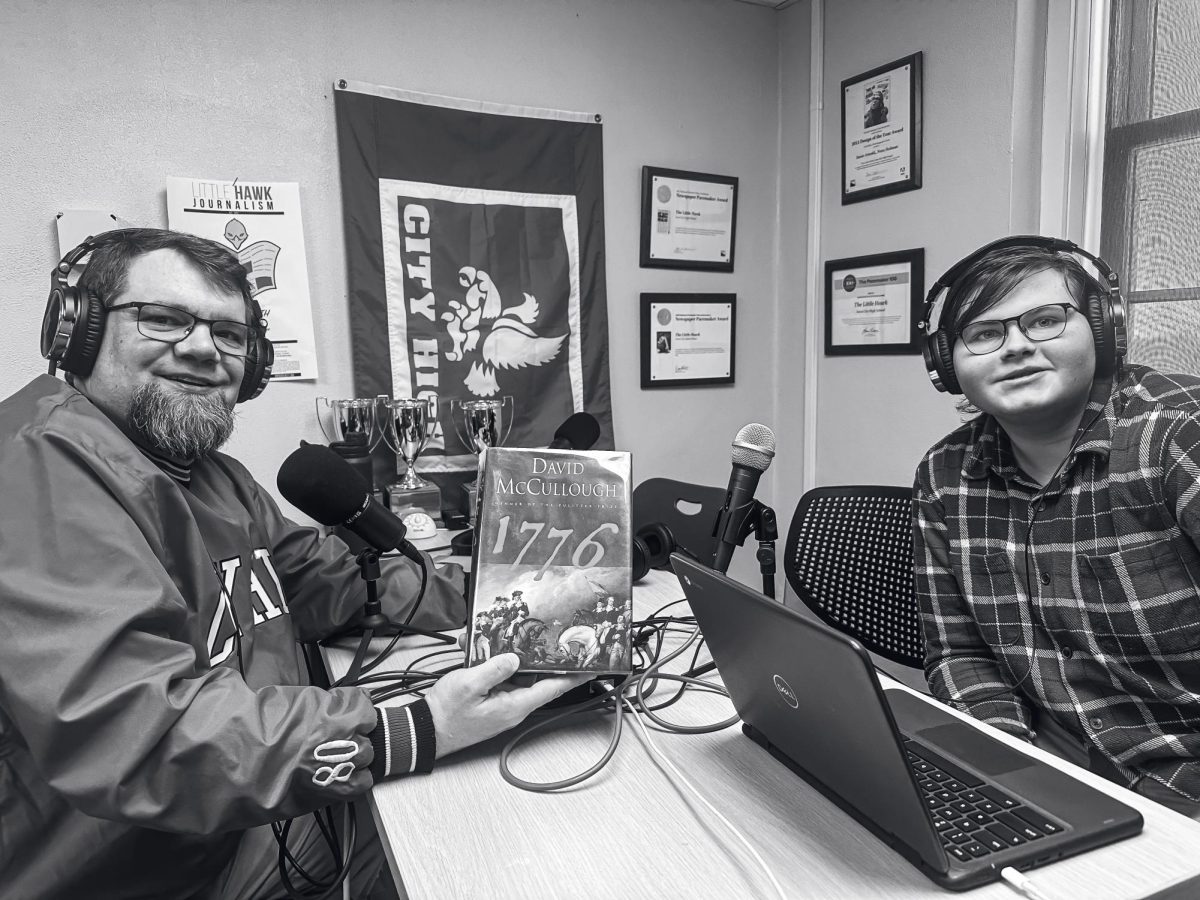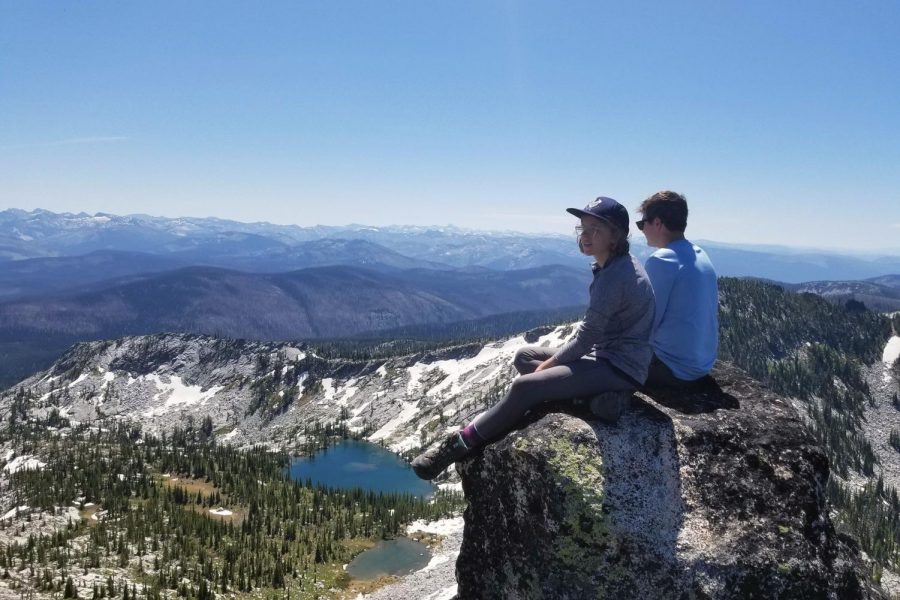Walking on Sunshine
Everly Eldeen ‘20, who grew up spending time outdoors, feels a biological connection to nature.
March 5, 2020
Reconnecting with your soul. That’s how Amanda Hardy, a psychologist who works at Healing Passages Birth & Wellness Center in Des Moines, describes what it is like to spend time in nature. This is in reference to the biophilia hypothesis stating that “humans possess an innate tendency to seek connections with nature and other forms of life,” as defined by the Britannica Encyclopedia.
“We as human beings know that we are part of nature,” Hardy said. “We come from the earth, we will return from the earth. Nature is our home; that is where we were born. And so we feel good [in nature].”
Everly Eldeen ‘20, who grew up spending time outdoors and is excited to pursue a career that will allow her to understand the natural world better, feels a similar connection to nature.
“I would say my connection [to nature] is definitely a biological connection and a[n] understanding of nature,” Eldeen said. “Biologically, humans have definitely been proven to have better mental health when they spend time outside, and I think that is because of the way that we all have not always lived in nice, air-conditioned [houses].”
For the majority of human existence, humans have primarily lived closely with nature. Only in the last 100 years have humans began to reside and spend the majority of their time indoors.
“We’re seeing people who are becoming more and more sedentary, which is contributing to obesity, high blood pressure, and type two diabetes, and all of these things seem to be such a vicious, vicious cycle,” Suzanne Bartlett Hackenmiller, an integrative medicine physician and medical director for the Association of Nature and Forest Therapy, said. “I think we’ve lost sight of this very basic idea that being outdoors is an antidote to a lot of those things.”
From her own experiences with patients, Bartlett Hackenmiller has seen the effects that nature can have on people.
“I take patients outside on a regular basis for different kinds of nature-related experiences and have found, through my own experience with that, that people find healing, both mentally and physically, by getting outdoors on a regular basis,” Bartlett Hackenmiller said.
Spending five minutes a day outside without technology can improve all parameters of a college student’s mental health.
“They increased the duration of time to 15 minutes to see if that improved things beyond the five minutes and they found that it really didn’t matter if you added 10 more minutes, people still derive the benefits of mood and self esteem just by getting outside for five minutes unplugged,” Bartlett Hackenmiller said.
Hardy explains how the benefits of spending time in nature can be obtained by taking a walk and focusing on the nature nearby.
“I’m looking at the street right now and it’s got old trees; it’s an old neighborhood, and so there is nature here right,” Hardy said. “Just a stroll down this road where I’m taking in the trees, or maybe I’ll pay attention to the bird sounds. That has been absolutely shown to reduce stress and anxiety.”
Mary Lestina, a science teacher at City High and the advisor of the environmental club, feels better when she is outside and tries to spend time outdoors for her mental health.
“[Being outdoors] allows me to think more clearly and to get a better idea of what I can even do for other things in my life,” Lestina said. “So it helps me problem-solve.”
Eldeen sees herself spending more time outdoors than her peers, from volunteering with bird banding organizations to taking care of the chickens in her backyard.
“iPhones are amazing, but I don’t think they can really compare it to spending time outdoors,” Eldeen said.
Climate change has impacted Eldeen personally, as she has seen drastic changes to the environment in her own lifetime.
“So, 18 years. It’s pretty small on the scale of the universe,” Eldeen said. “It’s incredible to think how much has changed [in] my lifespan and my parents’ lifespan. I’m a gardener and I’m noticing these growing seasons changing.”
As a person who has had mental health issues as a effect of climate change, Eldeen hopes that researchers will think more about the link between mental health, climate change, and spending time outdoors.
“I found out about the dire situation last year in October and that really sent me down a spiral,” Eldeen said. “I actually did start therapy and medication and all that, which is partially why I know so much about that kind of link. But I think it’s a huge issue.”
Eldeen is interested in going into a field where she can study birds and spend time outside.
“I hate to say it, but there are some really good people out there and some really horrible people, but I know that all the birds out there who can’t defend themselves are good,” Eldeen said. “It’s hard for me to think about how they are so vulnerable and that’s partially why I want to go into the field.”
Hardy has seen more and more patients express concern about climate change than she used to and describes this feeling as “existential dread.”
“I think that our awareness of climate change and knowing how that is affecting our lives [is] absolutely affecting mental health,” Hardy said.
On a broader scale, climate change is causing dangerous weather events that are detrimental to the livelihood of those living in affected areas and to global ecosystems.
“Climate change is affecting our fish and marine populations worldwide and that affects all of the ecosystem[s] across the board,” Bartlett Hackenmiller said. “I think that’s going to have major effects on us as a species down the road, both physically, mentally and psychologically.”
Lestina has seen these broader changes during her life, describing a park that she went to as a kid that looks different today.
“Now it floods, it seems like all the time, during the summer, so there’s trails that you can’t go on,” Lestina said. “[There are] a lot of mudslides and things that we didn’t have to deal with before; I mean, there was flooding, but it was periodic flooding, and now it seems like it’s closed all the time.”
Lestina describes trying to have a connection with nature even if she is in her classroom and can’t get outdoors.
“I try to [connect with nature] even when I can’t go outside,” Lestina said. “I have my windows open and I observe nature. I have a lot of things out in my yard…and I have a bird feeder and I have a garden, and so my dog spends a lot of time outside and I go outside a lot and it’s just a break and escape.”
Being able to see parts of nature can help children’s neurological development and help hospital patients recover from illnesses and surgeries.
“They looked at people in the hospital, I want to say that had gallbladder surgery, and…people that had a view of trees, or nature scape, they got better faster had fewer problems,” Hardy said.
Across the globe, doctors have seen more patients with vitamin D deficiency because people are staying inside and spending less time outdoors. Midwesterners have lower vitamin D levels than people who live in other parts of the country.
“We’re spending so much more time indoors and we get vitamin D from the sun,” Bartlett Hackenmiller said. “Vitamin D deficiency definitely contributes to health problems, both mental and physical health problems. Vitamin D deficiency has been associated with everything from autoimmune conditions and type two diabetes to even heart disease and cancer.”
Hardy believes that it is important to be aware of our connection to nature and how health benefits can be derived from spending time outdoors.
“Even just the little things matter…to reap the benefits of connecting with nature, the little things like sitting in the sunny window, going for a stroll,” Hardy said. “Being intentional and turning your awareness to those small ways we can connect with nature. It can be amazingly beneficial. It all adds up.”
































